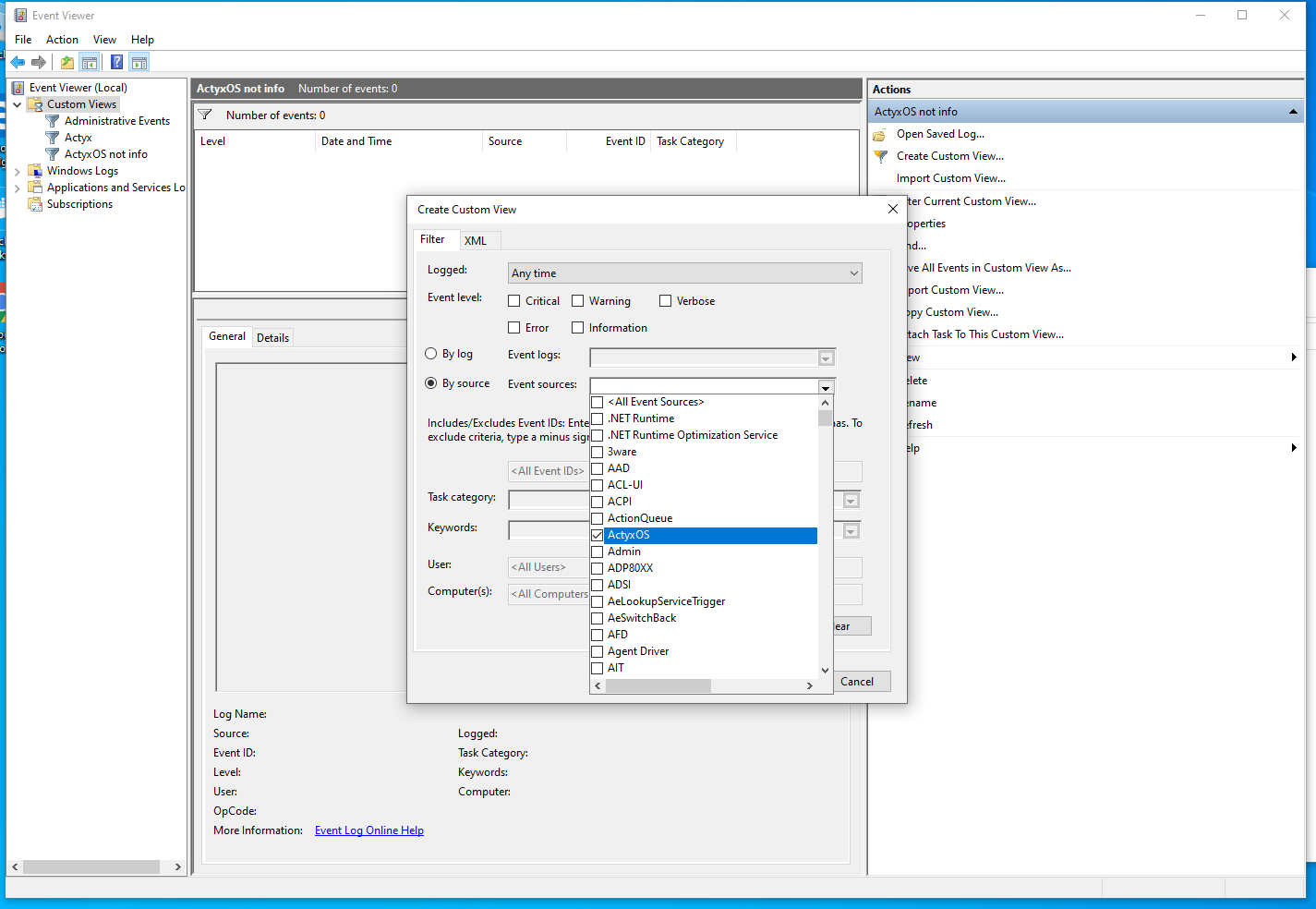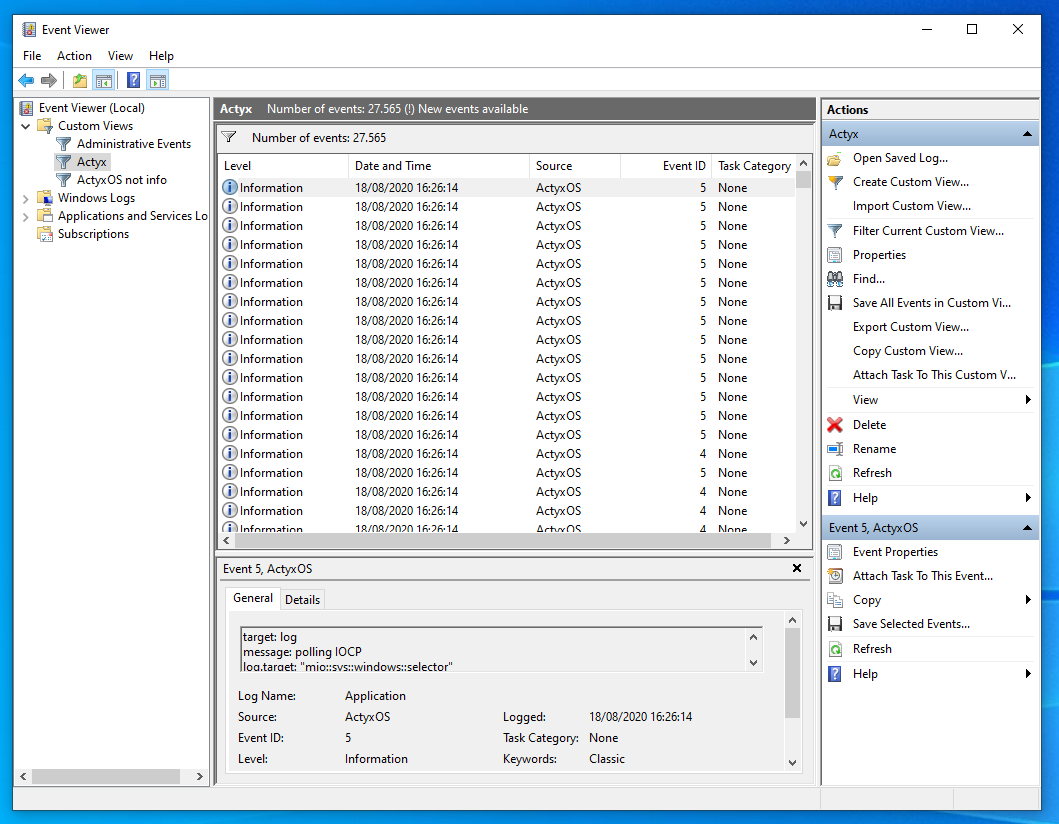Access logs
When working with Actyx, you can directly access your app and device logs on your host. The way you access them, depends on your operating system:
- Windows
- Linux/macOS/Docker
- Android
You can access Actyx logs through the Windows Event Viewer. In the Event Viewer, you can create a custom view filtering for Actyx logs and a log level:

You can then see all Actyx logs in that view:

On Linux, macOS, and Docker, Actyx logs to stdout so you should see logs in your terminal after startup:
$ ./actyx
May 25 18:03:14.722 INFO NODE_STARTED_BY_HOST: Actyx 2.0.0 is running.
May 25 18:03:14.731 INFO ADMIN_API_BOUND: Admin API bound to /ip6/::1/tcp/4458.
May 25 18:03:14.731 INFO ADMIN_API_BOUND: Admin API bound to /ip4/192.168.2.113/tcp/4458.
May 25 18:03:14.731 INFO ADMIN_API_BOUND: Admin API bound to /ip4/127.0.0.1/tcp/4458.
May 25 18:03:14.746 INFO SWARM_SERVICES_BOUND: Swarm Services bound to /ip6/::1/tcp/4001.
May 25 18:03:14.747 INFO SWARM_SERVICES_BOUND: Swarm Services bound to /ip4/127.0.0.1/tcp/4001.
May 25 18:03:14.750 INFO API_BOUND: API bound to [::1]:4454.
May 25 18:03:14.750 INFO API_BOUND: API bound to 127.0.0.1:4454.
...
If you are running Actyx on Docker, you can also access your logs with the docker logs command. By reconfiguring your Docker logging driver, you can also log to external systems or files.
On Android, you can access the logs using the logcat tool via USB debugging through adb. Both utilities are included in the official Android SDK.
If you don't need Android Studio, you can download only the command line tools here.
To tail the logs from the device, you need to enable USB debugging on your device
and run adb logcat -s com.actyx.
For further details, please refer to the logcat user guide.
$ adb logcat -s com.actyx
09-08 15:13:05.809 10202 10202 I com.actyx: node::node_storage: Using database /storage/emulated/0/Android/data/com.actyx.android/files/node.sqlite
09-08 15:13:05.844 10202 10234 I com.actyx: node::node: Actyx 2.3.1-dc8c5fc462516bf9877a67fb26b1e4c36c638d59-android-aarch64-release is starting
09-08 15:13:05.867 10202 10239 I com.actyx: ADMIN_API_BOUND: Admin API bound to /ip6/::1/tcp/4458.
09-08 15:13:05.868 10202 10239 I com.actyx: ADMIN_API_BOUND: Admin API bound to /ip4/127.0.0.1/tcp/4458.
09-08 15:13:05.869 10202 10239 I com.actyx: ADMIN_API_BOUND: Admin API bound to /ip6/2a02:810d:1640:174::e2fa/tcp/4458.
09-08 15:13:05.869 10202 10239 I com.actyx: ADMIN_API_BOUND: Admin API bound to /ip4/192.168.0.221/tcp/4458.
09-08 15:13:05.869 10202 10239 I com.actyx: ADMIN_API_BOUND: Admin API bound to /ip6/2a02:810d:1640:174:555c:9819:5c9a:618c/tcp/4458.
09-08 15:13:05.869 10202 10239 I com.actyx: ADMIN_API_BOUND: Admin API bound to /ip6/2a02:810d:1640:174:d638:9cff:feeb:8a7e/tcp/4458.
09-08 15:13:05.916 10202 10236 I com.actyx: SWARM_SERVICES_BOUND: Swarm Services bound to /ip6/2a02:810d:1640:174:d638:9cff:feeb:8a7e/tcp/4001.
09-08 15:13:05.916 10202 10240 I com.actyx: SWARM_SERVICES_BOUND: Swarm Services bound to /ip6/::1/tcp/4001.
09-08 15:13:05.916 10202 10240 I com.actyx: SWARM_SERVICES_BOUND: Swarm Services bound to /ip6/2a02:810d:1640:174:555c:9819:5c9a:618c/tcp/4001.
09-08 15:13:05.916 10202 10240 I com.actyx: SWARM_SERVICES_BOUND: Swarm Services bound to /ip6/2a02:810d:1640:174::e2fa/tcp/4001.
09-08 15:13:05.921 10202 10236 I com.actyx: SWARM_SERVICES_BOUND: Swarm Services bound to /ip4/192.168.0.221/tcp/4001.
09-08 15:13:05.921 10202 10240 I com.actyx: SWARM_SERVICES_BOUND: Swarm Services bound to /ip4/127.0.0.1/tcp/4001.
09-08 15:13:05.973 10202 10240 I com.actyx: API_BOUND: API bound to 127.0.0.1:4454.
09-08 15:13:05.973 10202 10234 I com.actyx: NODE_STARTED_BY_HOST: Actyx 2.3.1-dc8c5fc462516bf9877a67fb26b1e4c36c638d59-android-aarch64-release is running....
To enable debug logging, it is not sufficient to set the log level for the node in Actyx.
Additionally, you need to enable debug logging on your device by running adb shell "setprop log.tag.com.actyx DEBUG".
Rogcat is a wrapper application for logcat allowing to vizualize and filter logs more conveniently.
It also supports saving logs into a set of files of a maximum size, which is useful if you need to monitor your device over a longer period of time.